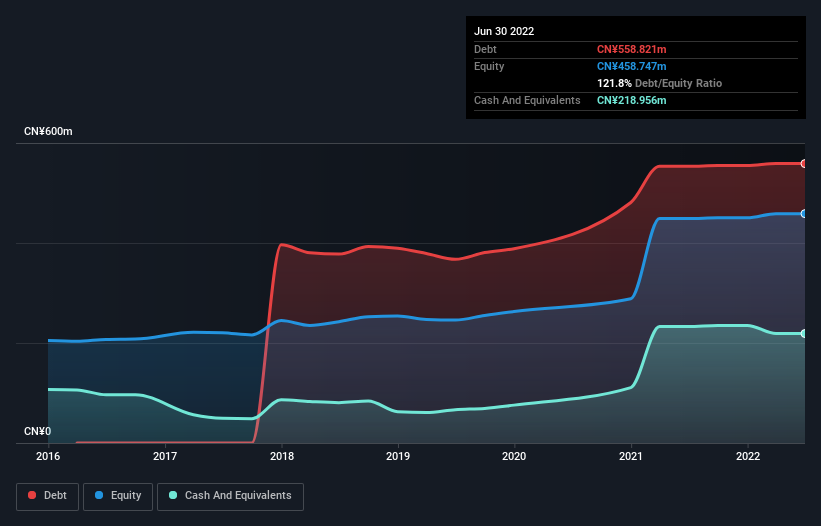
The external fund manager backed by Berkshire Hathaway's Charlie Munger, Li Lu, makes no bones about it when he says 'The biggest investment risk is not the volatility of prices, but whether you will suffer a permanent loss of capital.' When we think about how risky a company is, we always like to look at its use of debt, since debt overload can lead to ruin. As with many other companies Qingdao Holdings International Limited (HKG:499) makes use of debt. But should shareholders be worried about its use of debt?
Why Does Debt Bring Risk?
Debt is a tool to help businesses grow, but if a business is incapable of paying off its lenders, then it exists at their mercy. If things get really bad, the lenders can take control of the business. However, a more frequent (but still costly) occurrence is where a company must issue shares at bargain-basement prices, permanently diluting shareholders, just to shore up its balance sheet. By replacing dilution, though, debt can be an extremely good tool for businesses that need capital to invest in growth at high rates of return. The first step when considering a company's debt levels is to consider its cash and debt together.
Check out the opportunities and risks within the HK Real Estate industry.
What Is Qingdao Holdings International's Debt?
As you can see below, Qingdao Holdings International had CN¥558.8m of debt, at June 2022, which is about the same as the year before. You can click the chart for greater detail. However, it does have CN¥219.0m in cash offsetting this, leading to net debt of about CN¥339.9m.

How Strong Is Qingdao Holdings International's Balance Sheet?
We can see from the most recent balance sheet that Qingdao Holdings International had liabilities of CN¥216.4m falling due within a year, and liabilities of CN¥373.6m due beyond that. On the other hand, it had cash of CN¥219.0m and CN¥194.4m worth of receivables due within a year. So its liabilities total CN¥176.7m more than the combination of its cash and short-term receivables.
When you consider that this deficiency exceeds the company's CN¥153.8m market capitalization, you might well be inclined to review the balance sheet intently. In the scenario where the company had to clean up its balance sheet quickly, it seems likely shareholders would suffer extensive dilution.
In order to size up a company's debt relative to its earnings, we calculate its net debt divided by its earnings before interest, tax, depreciation, and amortization (EBITDA) and its earnings before interest and tax (EBIT) divided by its interest expense (its interest cover). Thus we consider debt relative to earnings both with and without depreciation and amortization expenses.
Strangely Qingdao Holdings International has a sky high EBITDA ratio of 27.6, implying high debt, but a strong interest coverage of 1k. So either it has access to very cheap long term debt or that interest expense is going to grow! Notably, Qingdao Holdings International's EBIT launched higher than Elon Musk, gaining a whopping 109% on last year. The balance sheet is clearly the area to focus on when you are analysing debt. But it is Qingdao Holdings International's earnings that will influence how the balance sheet holds up in the future. So if you're keen to discover more about its earnings, it might be worth checking out this graph of its long term earnings trend.
Finally, while the tax-man may adore accounting profits, lenders only accept cold hard cash. So the logical step is to look at the proportion of that EBIT that is matched by actual free cash flow. Happily for any shareholders, Qingdao Holdings International actually produced more free cash flow than EBIT over the last three years. That sort of strong cash conversion gets us as excited as the crowd when the beat drops at a Daft Punk concert.
Our View
Based on what we've seen Qingdao Holdings International is not finding it easy, given its net debt to EBITDA, but the other factors we considered give us cause to be optimistic. There's no doubt that its ability to to cover its interest expense with its EBIT is pretty flash. When we consider all the elements mentioned above, it seems to us that Qingdao Holdings International is managing its debt quite well. But a word of caution: we think debt levels are high enough to justify ongoing monitoring. When analysing debt levels, the balance sheet is the obvious place to start. However, not all investment risk resides within the balance sheet - far from it. To that end, you should learn about the 4 warning signs we've spotted with Qingdao Holdings International (including 2 which are potentially serious) .
When all is said and done, sometimes its easier to focus on companies that don't even need debt. Readers can access a list of growth stocks with zero net debt 100% free, right now.
Valuation is complex, but we're here to simplify it.
Discover if Qingdao Holdings International might be undervalued or overvalued with our detailed analysis, featuring fair value estimates, potential risks, dividends, insider trades, and its financial condition.
Access Free AnalysisHave feedback on this article? Concerned about the content? Get in touch with us directly. Alternatively, email editorial-team (at) simplywallst.com.
This article by Simply Wall St is general in nature. We provide commentary based on historical data and analyst forecasts only using an unbiased methodology and our articles are not intended to be financial advice. It does not constitute a recommendation to buy or sell any stock, and does not take account of your objectives, or your financial situation. We aim to bring you long-term focused analysis driven by fundamental data. Note that our analysis may not factor in the latest price-sensitive company announcements or qualitative material. Simply Wall St has no position in any stocks mentioned.
About SEHK:499
Qingdao Holdings International
An investment holding company, engages in the property leasing activities in Hong Kong and Mainland China.
Slight with mediocre balance sheet.
Market Insights
Community Narratives



